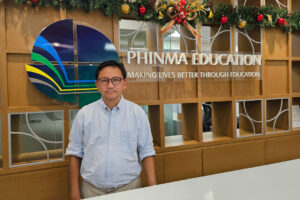
01 Dec How PHINMA Education aims to boost school access
By Revin Mikhael D. Ochave Reporter
PHINMA Education Holdings, Inc. hopes to help increase access to education for Filipinos by expanding its network of affordable schools, a company executive said.
“Our aspiration is that every Filipino be given a chance to pursue their education and make their lives better,” Christopher “Happy” A. Tan, PHINMA Education country chief for the Philippines, said in an interview with BusinessWorld.
In July, the Philippine Statistics Authority said the country’s poverty rate shrank to 15.5% in 2023, equivalent to 17.54 million Filipinos living in poverty, compared with the 18.1% estimate in 2021.
“Our dream is to be a school network that produces thousands of board passers every year. This means we’re producing thousands of professionals every year because that’s how we will make an impact on poverty,” Mr. Tan said.
“By producing professionals, that will mean that you’ll have more families that will have cash flow to move out of poverty,” he added.
Mr. Tan has been with PHINMA Education for seven years. Prior to this, he was a human rights lawyer and was also involved in microfinance and development work.
PHINMA Education is the education unit of the Del Rosario-led conglomerate PHINMA Corp. It began operating in the education services sector in 2004 after the acquisition of PHINMA Araullo University in Nueva Ecija.
Other PHINMA Education schools include PHINMA Cagayan de Oro College, PHINMA University of Pangasinan, PHINMA University of Iloilo, and Southwestern University PHINMA in Cebu City. The company also operates Horizon Karawang in West Java, Indonesia.
PHINMA Chairman and Chief Executive Officer Ramon R. del Rosario, Jr. previously said that PHINMA Education now has 167,000 students following the recent acquisition of a school in Cavite that has 3,000 students.
Mr. Tan said PHINMA Education wants more schools to serve low-income students as it could help widen education access in the country.
“We would like to create a paradigm shift in the way schools operate. Right now, they don’t want to serve low-income students for multiple reasons, but part of which is they don’t necessarily think that it makes economic sense,” he said.
“What we would like to do is to convince a lot more schools that this isn’t us being nice. This is double bottom line. This is a public good, but it also makes financial sense. When we do that, then we shift the industry. The goal is not to dominate the industry, but to reduce poverty,” he added.
To improve the country’s quality of education, Mr. Tan said efforts should begin during the early years of the student’s journey.
“What do we need to do with grade school? We need to make sure that teacher education and teacher training is solid. You remove policies that make it hard for teachers to focus on their core work. Many teachers spend a lot of their hours on administrative issues. We should make sure that they have good teacher training,” he said.
“We also need to make sure that we have good assessment systems, not just grades because that can be rigged. You need to have standardized systems. We also should make sure to deal with issues of malnutrition,” he added.
In addition to this, Mr. Tan said the country needs an educational system that is more responsive to the needs of local employers.
“We should be able to understand the needs of local employers,” he said.
“However, we cannot control Filipinos if they want to find jobs outside the country. But I’m hoping that we, as a country, will give Filipinos the opportunity to choose,” he added.
Mr. Tan said PHINMA Education is also implementing active learning across its schools, as it helps improve the skills of both teachers and students.
“If you do active learning, you shift your role from being a lecturer to a facilitator of learning. This means that you have to pay attention to how individual students struggle with the content,” he said.
“We all learn best when we grapple with a problem rather than when we are passively listening to a lecture. It’s about deliberate practice. You actually do it,” he added.
In October, Phoenix Investments II Pte. Ltd. completed its P2.52-billion initial investment in PHINMA Education. The amount represented 70.22% of KKR’s total investment worth P3.59 billion. Phoenix Investments is an investment vehicle of funds managed by global investment firm KKR. The funds will be used to finance PHINMA Education’s growth plans.
PHINMA Education saw an 84% overall board passing rate, with 31 board exam topnotchers in various fields, for the school year 2023-2024.
